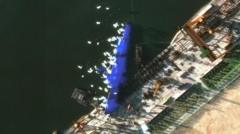SpaceX's latest Starship test flight ended prematurely with the upper stage lost shortly after launch from Texas, despite the successful return of the Super Heavy booster. CEO Elon Musk is optimistic about gaining insights to improve future reliability, while competitors like Blue Origin marked significant progress with their own successful launch.
SpaceX Starship Test Encountering Setbacks Amid High Hopes for Future Launches

SpaceX Starship Test Encountering Setbacks Amid High Hopes for Future Launches
Following a recent failure during a test flight, SpaceX is determined to analyze data to enhance Starship reliability while competitor Blue Origin achieves its orbital milestone.
In a challenging turn of events, SpaceX’s latest test of its flagship Starship rocket ended in failure shortly after its launch from Boca Chica, Texas, on Thursday. During the seventh test mission, the Starship's upper stage lost contact just minutes post-lift-off, leading to what SpaceX describes as a “rapid unscheduled disassembly” during its ascent. This setback came concurrently with Blue Origin's inaugural launch of the New Glenn rocket system, revealing the competitive landscape in space technology.
While the fate of the Starship upper stage remains under investigation, the Super Heavy booster executed its return to the launchpad flawlessly, garnering applause from ground control teams. SpaceX reported that preliminary findings suggest an oxygen/fuel leak contributed to the malfunction, prompting efforts to analyze flight data for a clearer understanding of the incident.
On social media, Elon Musk humorously noted, “Success is uncertain, but entertainment is guaranteed!” as he shared visuals of the rocket's fiery descent over the Caribbean. He also expressed confidence that improved iterations of both the Starship and Super Heavy rockets are on standby for future launches.
Despite the challenges, the flight garnered significant attention, with viewers logging over 7.2 million views on the SpaceX livestream. The mission was marked by a critical step: the planned separation of the upper stage from the booster occurred nearly four minutes into flight. However, the situation took a turn shortly thereafter when mission teams reported the loss of contact with the spacecraft.
The FAA confirmed its awareness of the anomaly, momentarily adjusting air traffic in the surrounding areas due to falling debris, but noted that normal operations resumed shortly after. This incident follows the successful launch of two lunar landers and a micro rover by SpaceX from Florida, showcasing the ongoing advancements in private space exploration. As Musk and Bezos race to ascend the ranks of space innovation, each failure and success brings new lessons and opportunities for progress in the industry.


















